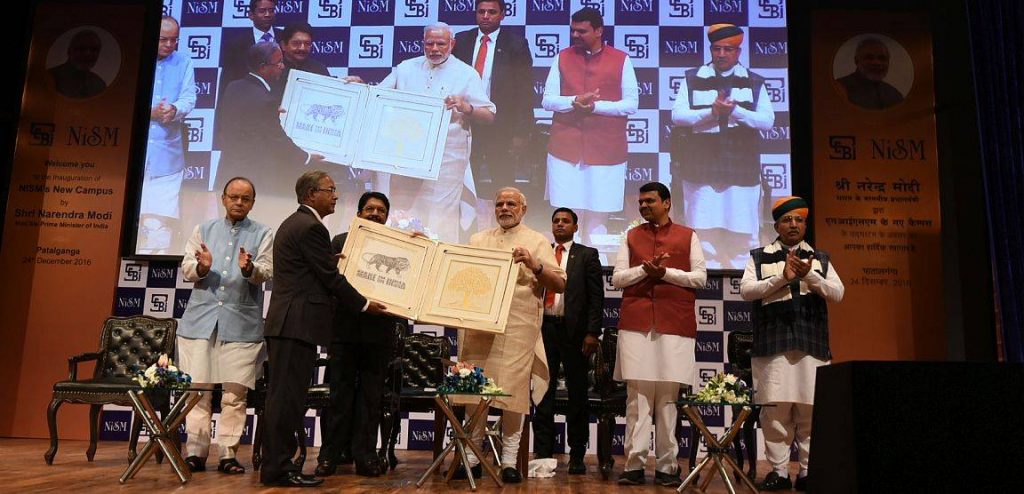‘PM Shri Narendra Modi Inaugurates NISM Campus’ NISM Campus, Patalganga, Raigad | December 24, 2016

Prime Minister Narendra Modi at the inauguration of a new campus of National Institute of Securities Markets (NISM) along with (from L) FM Arun Jaitley, Maharashtra Governor C Vidyasagar Rao, CM Devendra Fadnavis and Union Corporate Affairs Minister Arjun Ram Meghwal at Patalganga.
Prime Minister Shri Narendra Modi has called for considering methods for increasing taxes in a fair, efficient and transparent way for financial market participants.
Inaugurating the National Institute of Securities Markets (NISM) campus at Patalganga in Navi Mumbai, Modi said, “for various reasons, the contribution of tax from those who make money on the markets has been low. To some extent, it may be due to illegal activities and fraud. To stop this, SEBI has to be extremely vigilant. To some extent, the low contribution of taxes may also be due to the structure of our tax laws. Low or zero tax rate is given to certain types of financial income. I call upon you to think about the contribution of market participants to the exchequer.”
With the government recently amending tax treaties to eliminate the feeling of certain investors getting an unfair deal, Modi said, “as you know, those treaties have been amended by this government. Now it is time to re-think and come up with a good design which is simple and transparent, but also fair and progressive.”
He felt that the real value of our securities markets lay in their contribution to nation development, improvement of all sectors besides contributing to the welfare of all citizens.
He observed that derivatives markets have a use in managing risk but many felt trading is dominating markets and the tail is wagging the dog instead of the primary aim of stock markets being helping in capital raising. He urged the financial market experts present at the event to find ways of providing long term capital for infrastructure using the capital market route.
He was disappointed that India did not have a municipal bond market and raised a question whether SEBI and the Department of Economic Affairs could ensure that at least 10 cities in India issue municipal bonds within one year.
He noted that farmers in India rarely used commodity derivatives and said, “the markets must provide benefits to the largest section of our society — namely our farmers. The true measure of success is the impact in villages, not the impact in Dalal Street or Lutyens’ Delhi. By that yardstick, we have a long way to go.”
“Unless and until we make the commodity markets directly useful to farmers, they are just a costly ornament in our economy, not a useful tool. This Government has introduced e-NAM – the electronic National Agricultural Market. SEBI should work for closer linkage between spot markets like e-NAM and derivatives markets to benefit farmers,” he concluded.

